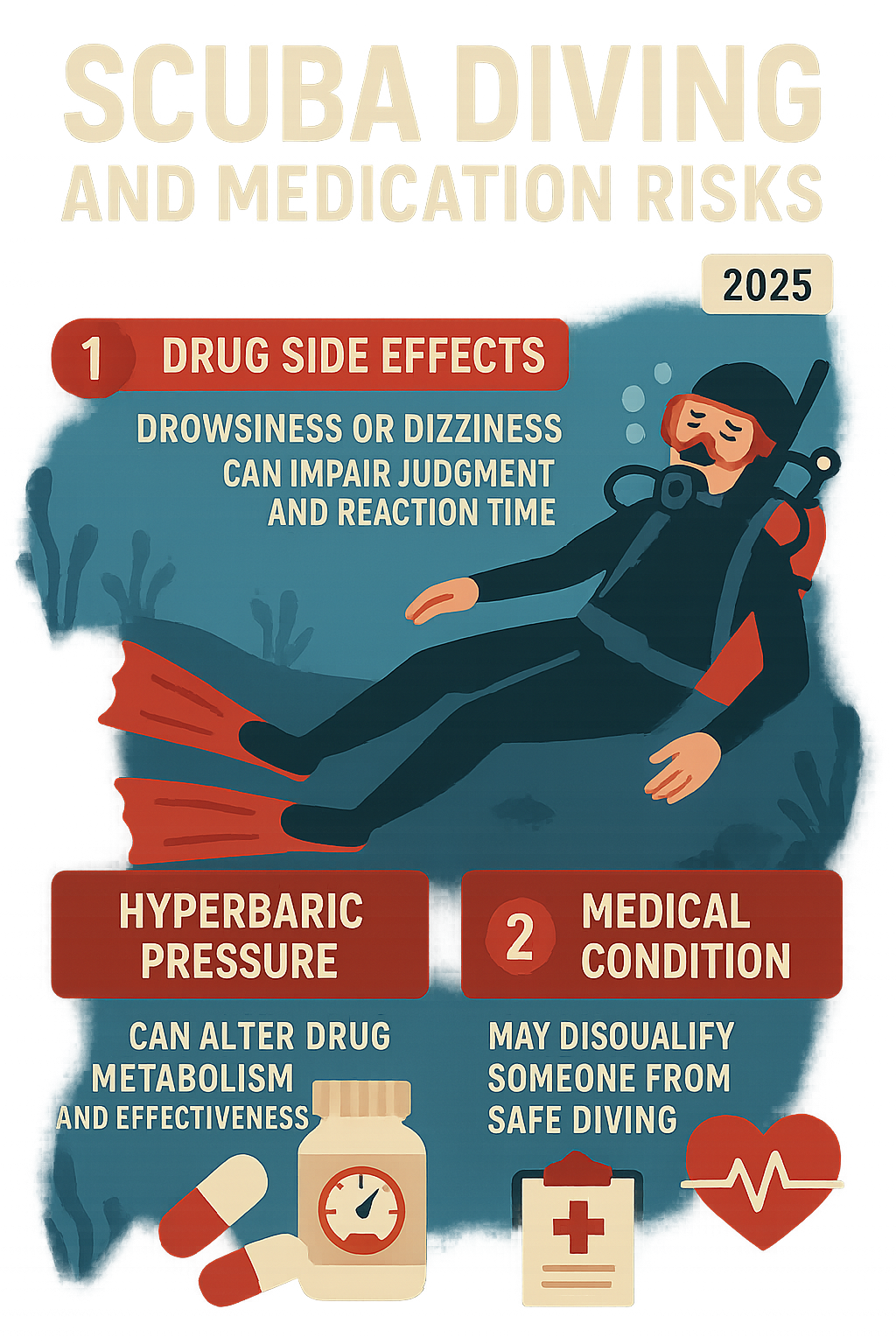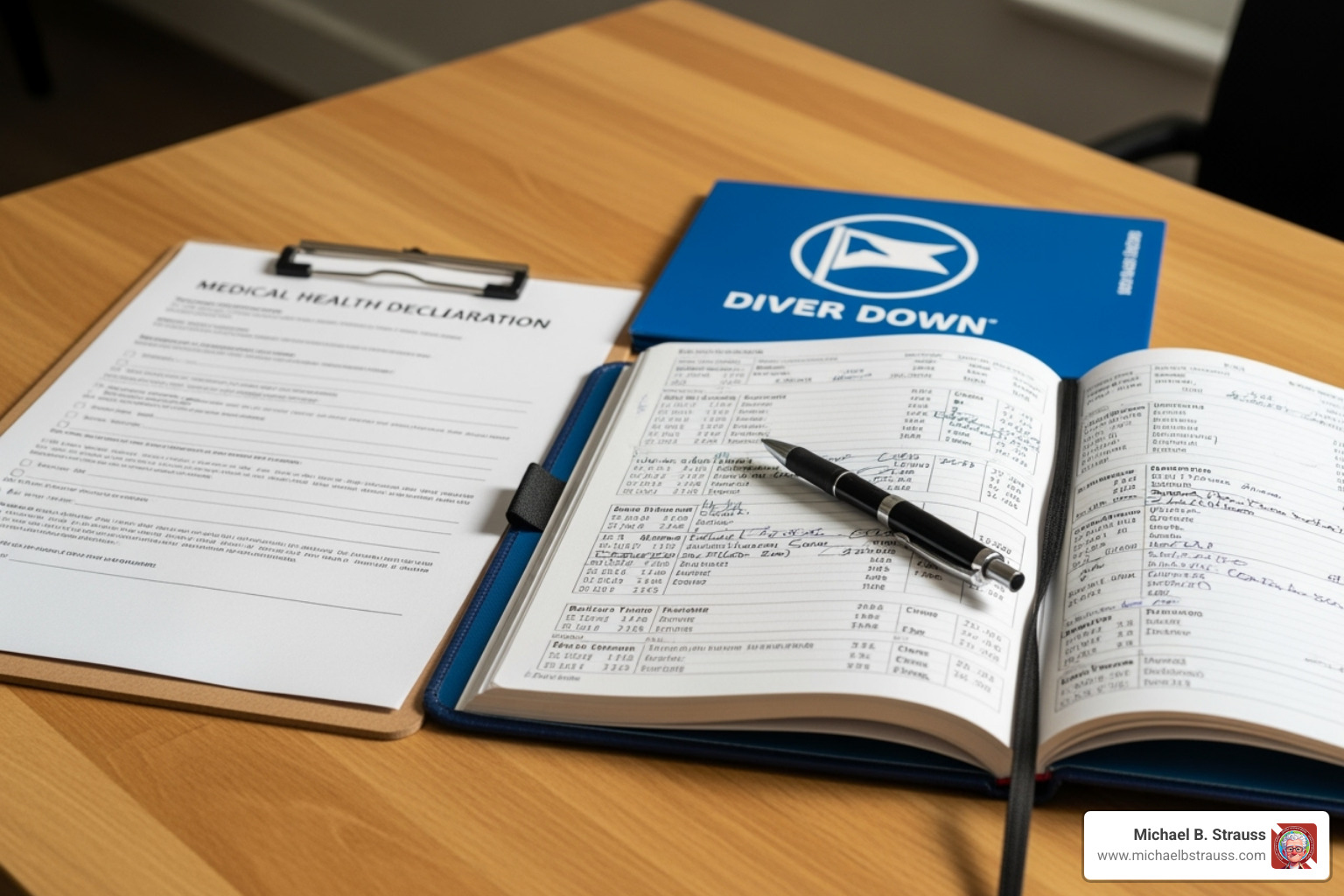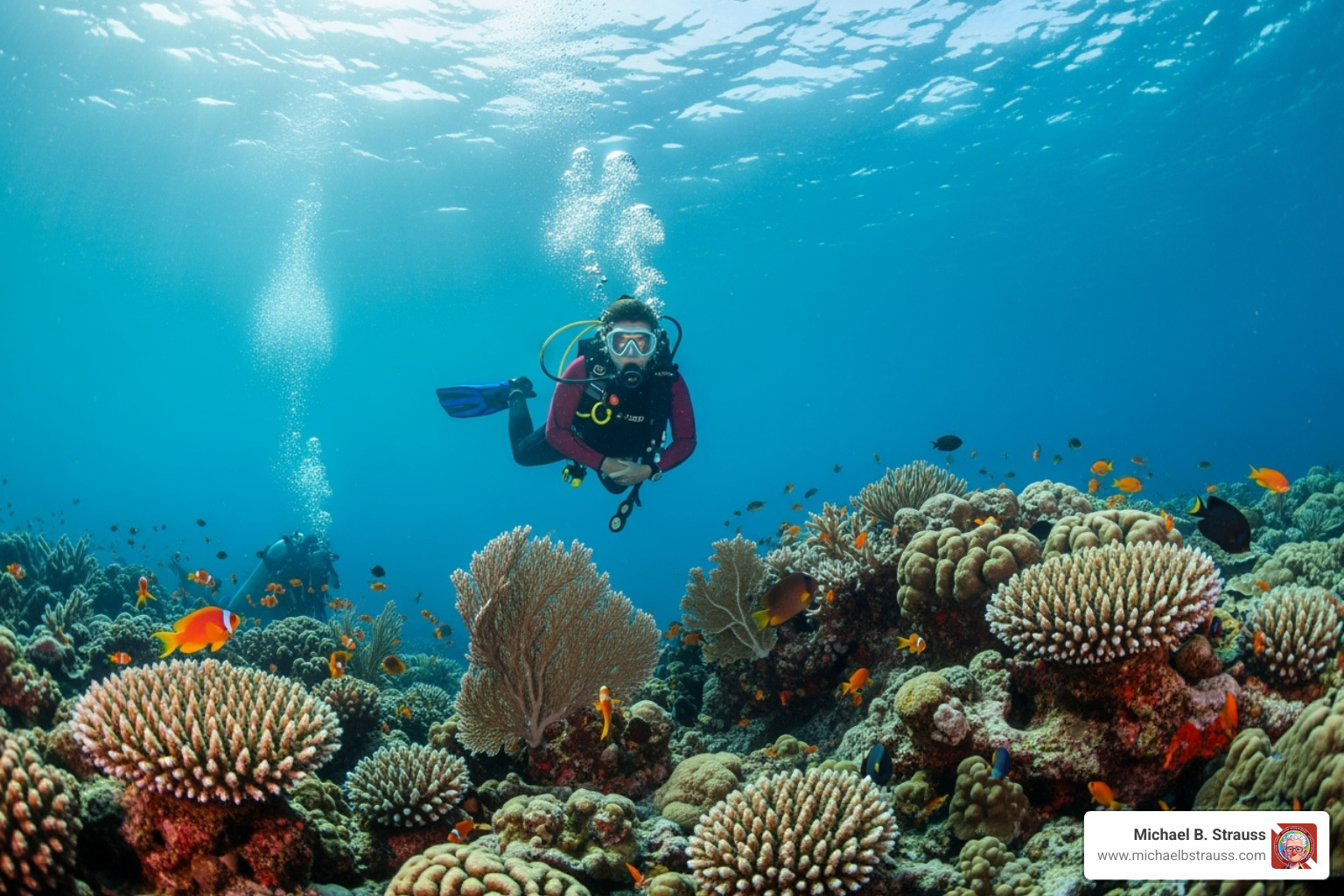The Hidden Risks of Diving on Medication
Scuba diving and medications can create dangerous combinations. Many divers assume prescription or over-the-counter (OTC) drugs are safe for diving, but the reality is far more complex. The unique underwater environment can alter a drug's effects, and the medication can mask symptoms of serious problems like decompression sickness.
Quick Answer for Safe Diving with Medications:
- Consult your doctor before diving with any medication.
- Test new medications on land for at least 30 days before diving.
- The underlying condition is often a greater risk than the medication.
- Avoid drugs that cause drowsiness, dizziness, or impaired judgment.
- Never dive if you need medication just to make the dive possible.
Research shows that a quarter of experienced divers take daily medication, yet most drugs have never been tested in hyperbaric conditions. Increased pressure can change how your body processes medication, and nitrogen narcosis can worsen side effects.
Crucially, the medical condition requiring the drug often poses the greatest risk. For example, someone taking decongestants to equalize may have an underlying issue that increases barotrauma risk. With over 300,000 OTC medications on the market, most of which are unstudied for diving, divers are often left with incomplete information to make critical safety decisions.

Scuba diving and medications basics:
How Medications and Diving Interact: A Deep Dive into the Risks
When considering scuba diving and medications, the interaction is complex, involving the drug, your body, and the unique demands of the underwater world.
The Underlying Condition: More Important Than the Medication Itself

Often, the medical condition requiring a prescription poses a greater risk than the medication itself. Before considering a drug's side effects, ask: is the underlying health issue compatible with diving? Conditions like epilepsy, heart disease, or asthma can be disqualifying, as the risk of a seizure, cardiac event, or air-trapping incident underwater is severe.
Medications can also mask symptoms of dive-related problems. A simple pain reliever could hide the early signs of decompression sickness (DCS), delaying critical treatment. Similarly, a decongestant might allow a diver to descend, but if it wears off at depth, a dangerous "reverse block" and barotrauma can occur on ascent.
Pain medications carry special risks. Narcotics like Hydrocodone cause drowsiness and impaired judgment, making them completely unsafe for diving. Even over-the-counter NSAIDs like ibuprofen can cause stomach issues or increase bleeding risk, which could worsen an injury like inner ear barotrauma. For more insights, see Evaluation and Management of Pain-Related Medical Problems of Diving.
Common Drug Classes and Their Specific Dangers for Divers
Most medications have not been tested in a hyperbaric environment, so our knowledge is based on their known effects on land and applying that to the unique stresses of diving.
- Decongestants: Ingredients like pseudoephedrine can cause nervousness and a rapid heartbeat. Their biggest danger is "rebound congestion," where the drug wears off at depth, preventing equalization during ascent and causing barotrauma.
- Antihistamines: Drugs like diphenhydramine (Benadryl) are known to cause drowsiness and slow reaction times. These effects are amplified by nitrogen narcosis, severely impairing a diver's judgment and coordination.
- Analgesics (Pain Relievers): Besides masking DCS symptoms, narcotics are unsafe due to sedation. NSAIDs (ibuprofen, naproxen) can cause stomach upset and increase bleeding risk, complicating injuries.
- Motion Sickness Medication: While tempting, drugs like dimenhydrinate (Dramamine) cause significant drowsiness and cognitive impairment, which is dangerous underwater.
- Antidepressants: This is a complex area. While many dive safely on stable, long-term SSRI prescriptions like Sertraline (Zoloft), potential risks include sedation, anxiety, and a slightly increased bleeding risk. A thorough evaluation with a diving medicine specialist is essential, and a conservative depth limit is often recommended. Learn more about Medication Effects Under Pressure and The Mammalian Divers.
Hyperbaric Effects: How Pressure Alters Your Body's Response to Drugs
The hyperbaric environment can alter how drugs affect the body. Since human testing is limited, we must be cautious. Increased pressure may change how a drug is absorbed or metabolized, making it more or less potent than on the surface.
The most significant interaction is with nitrogen narcosis. Any medication that affects the central nervous system (CNS)—such as sedatives, antihistamines, or narcotic pain relievers—can have its effects amplified at depth. This combination dangerously impairs judgment, coordination, and reaction time. Furthermore, some medications may lower the seizure threshold, theoretically increasing the risk of oxygen toxicity, especially on deeper or nitrox dives. For more on the science, see Decompression Science.
OTC vs. Prescription: Understanding the Risks of Scuba Diving and Medications
It's a dangerous mistake to assume over-the-counter (OTC) drugs are automatically safe for diving. The ease of purchase creates a false sense of security. Common OTC medications like pseudoephedrine (decongestants), ibuprofen (pain relievers), and diphenhydramine (antihistamines) all carry significant risks for divers, from rebound congestion and barotrauma to impaired judgment and increased bleeding.
The rule is simple: whether a drug is prescription or OTC, if it can affect your body or mind on land, it can affect you differently and more dangerously underwater. Always consider the risks. For more on the science of diving, explore Diving Science.
Your Pre-Dive Safety Protocol: Diving Smart with Medications
To keep your dives safe and enjoyable when taking medication, you must have a solid plan before you get near the water. This isn't about worrying; it's about being a smart, prepared diver.
How to Safely Assess a New Medication Before Diving

Before diving with any new medication, follow this safety protocol:
- Consult your doctor. This is non-negotiable. Ideally, speak with a physician trained in diving medicine for personalized advice.
- Read the package insert. Understand all potential side effects, especially those that impair judgment, cause drowsiness, or affect coordination. You can also check official guidance at the U.S. Food & Drug Administration website.
- Test the medication on land first. Never take a new drug for the first time just before a dive. Give yourself a trial period of at least 30 days to ensure you are free of side effects.
- Never stop prescribed medication without medical advice. The underlying condition may be the bigger risk, and sudden cessation can be dangerous.
- Inform your dive buddy. Make sure your buddy knows about any medications you are taking in case of an emergency.
Expert Advice and Final Checks for Scuba Diving and Medications
The consensus among diving medicine experts is clear: your underlying health is the primary factor. While no definitive "do not dive" list exists for all drugs, certain medication types are absolute contraindications for diving.
Avoid diving if you take medications that:
- Increase seizure risk.
- Cause drowsiness, dizziness, or impair judgment (e.g., narcotics, sedatives).
- Mask pain or other symptoms of dive injuries like DCS.
- Significantly increase bleeding risk (e.g., blood thinners).
- Affect cardiac function or exercise tolerance.
When to Sit Out a Dive:Always abstain from diving if:
- You need medication just to be able to dive (like a decongestant for a cold).
- You are experiencing any side effects that could impair your awareness or physical ability.
- Your underlying medical condition is not stable and well-managed.
- You have not completed a safe, 30-day trial of a new medication on land.
Insights from Dr. Michael B. Strauss:Dr. Strauss emphasizes that making conservative choices based on professional medical advice is key to a long and safe diving life. Pushing your luck can lead to disaster, while prioritizing safety ensures many more years of exploring the ocean.
For more expert advice on diving and your health, check out Diving Science.
A quick but very important note: This information is for educational purposes only and is not a substitute for professional medical advice. Always talk to a qualified healthcare provider and a specialist in diving medicine before you dive with any medication.
For a deeper dive into the science behind safe diving practices, get your copy of Diving Science, Revisited today! Buy the book here.
DISCLAIMER: Articles are for "EDUCATIONAL PURPOSES ONLY", not to be considered advice or recommendations.






